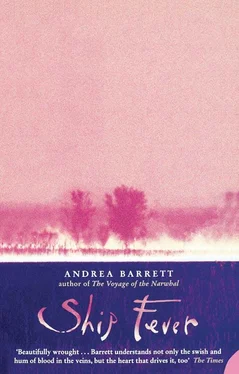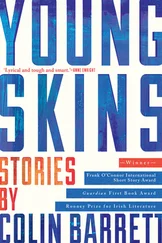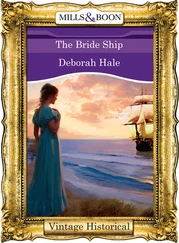“It’s time for you to leave,” he said. “Where will you go?” Not a word to acknowledge the days they’d spent working side by side. She could almost hear his brain whirring, ticking off all he had yet to do. On his desk, next to the money box, was a long list of what looked like names — attendants and other staff, she guessed, to be paid off and sent on their way. After he counted out her wages he made a small mark by the line that represented her. He was very tired, she knew.
“I can’t say yet,” she told him. “I’ll try to find my brothers, first.”
“I wanted to give you something,” he said. He reached under his desk. “It’s a satchel, for your things.”
It was made of heavy carpeting and was quite clean, although not new. Perhaps it had belonged to one of the physicians, or one of the priests. “Thank you,” she said.
“Thank you. ”
And so November 2 found her aboard the St. George and headed up the freezing river. Along the banks she could see the ice extending further every hour. The breeze was icy as well, and low grey clouds scudded across the horizon. A few flakes of snow fell and she burrowed deeper into her cloak. Someone’s cast-off, true. And yet the cloak was warm and whole and clean, the fabric wonderfully thick, the buttonholes frayed only slightly and the torn satin binding nicely mended. The boots she’d found were too big, but the newspaper she’d stuffed into their toes acted as insulation. Her feet were remarkably warm.
The sheer cliffs of Cape Diamond were a surprise; the bustling harbor, as busy as Liverpool, another. No one had told her the city was walled, or that the two addresses she’d asked Dr. Douglas to write out for her on a scrap of paper were not in the Lower Town, near the wharf where she disembarked, but high on the cliff and within the walls. Three times she asked strangers for directions to her first address; she got lost among the narrow cobbled streets and again emerging from the stairs at the top of the cliff. The strangers who looked at her scrap of paper and directed her on were distant but not rude. The dress, she thought, and blessed it. The cloak and the satchel and her boots. Later, when she would go in search of a boarding-house where she might spend a few nights, these clothes might keep her from unpleasant treatment.
Caleches passed her on the snow-covered streets, the horses pulling the runnered sleighs as cheerfully as if they pulled carriages. She had prepared herself for disappointment at the newspaper office, but still the clerk’s flat words almost flattened her as well. No word of Ned and Denis, from either advertisement. In her mind’s eye she saw the river, malignant and frozen, stretching for hundreds of miles through a country she could never penetrate, to cities that were only names. Kingston, Toronto — what were the chances of her finding her brothers in either place? What were the chances that Ned and Denis had not been pushed from those unreachable cities, looking for work as loggers or farmhands? What were the chances that they were still alive?
Two boys, out of the hundred thousand Irish emigrants who’d made the voyage to the Canadian provinces this season; two among all those who’d died on the passage over, or at Grosse Isle, or in Quebec and Montreal and further inland. But the numbers dead on the ships and the island meant nothing here in the city; the faces behind them could not be seen. As she walked toward her second address and came upon the market, she thought how the prosperous folk here forgot the numbers as soon as they sat down to breakfast or dinner, surrounded by this beautiful food — oh, the food in this market was astonishing!
She inched toward a tower of hot mutton pies, drawn by the smell and disguised by her blue dress. In her pocket was more money than she’d ever had before, and when the roundfaced farmwoman told her the price of a pie she drew out a coin and ate her purchase right there. Flaky crust, hot spiced mutton, savory gravy that oozed with every bite; she closed her eyes as she chewed and thought how easy it would be to forget death in a place like this.
There was a cathedral just in front of her, where surely services had been held for the dead. But right here, within arm’s reach, were muffins and large fried cakes and fresh butter and eggs. On the island food had been scarce and bad, cooked all at once in giant kitchens and distributed by the authorities: enough to keep them all alive, enough to make her give thanks every day, but by no means appetizing. Even back home, when there was still any food at all, a woman might have sat before a board on which were two or three eggs, a single ball of butter, perhaps a chicken or a goose. Here the eggs stretched like sand on a beach, the geese hung in rows by their beautiful feet, potatoes spilled from bags and oysters came not singly, nor even by the dozen, but by the barrel. As she watched, women with baskets over their arms made their purchases as if there were nothing unusual about the plenitude surrounding them. Haggling seemed like a sport for them; they bickered cheerfully. Some, having filled baskets with more food than Nora could comprehend, still had enough money left to buy odds and ends for sheer pleasure. Cedar boughs, balsam, candles.
She bought a heavy golden muffin and ate that too; her mouth watered and her head spun. She touched potatoes and onions and cabbages, apples and squashes and leeks, and then she pulled herself together and moved on, to the address on Palace Street.
The neat flagstone walk had been swept clear, and someone had knocked most of the snow from the shrubberies. For a minute she thought of going round to the servants’ entrance, but this was no servant’s errand she was on. She walked up to the handsome front door and knocked firmly on the center panel, below a carved decoration. Some kind of writing, she thought, staring at the intertwined shapes. Someone’s name, perhaps? Annie Taggert opened the door.
The two women gazed at each other, each assessing the other’s probable origins and position. Nora took note of Annie’s worn shoes and reddened hands and coppery hair, but she also saw the care with which that hair was braided and pinned, the good-quality cloth of the simple dress, and the clean white apron, well-pressed and starched. Another Irishwoman, clearly, but one who had been here for some time and who was respected in this prosperous house. Annie, very busy this day, still registered the disparity between Nora’s dress and boots, nicer than her own, and the worn, thin, absolutely Irish face. A new one, Annie thought. Another like Sissy. Who did this girl think she was, aping her betters in those clothes?
“There’s no work here,” Annie said frostily. “And you oughtn’t be coming to this door — you go around back if you’re looking for food, perhaps cook will have something for you.”
Nora flushed. “It’s not work I’m needing,” she said, although soon enough she would. “Nor food.”
Before she could finish speaking, Annie tried to slam the door on her. Nora wedged her satchel between the door and its frame and said, “I have a message for Mrs. Rowley. It’s important. Would you fetch her for me, please?”
It was too much, Annie thought. Everything that had happened these past six months; it was simply too much. She owed this girl no explanations, but she did open the door a little wider. Perhaps she had not taken sufficient account of the quality of that blue dress. Perhaps this girl had important friends? “Mrs. Rowley is not available,” she said. “You may leave the message with me.”
“Is Mr. Rowley available, then?”
“He’s busy,” Annie said. “But you can be sure whatever you leave with me will reach him.”
Nora shook her head and refused to move. “It’s important. And I have a parcel as well. I will wait.”
Читать дальше
Конец ознакомительного отрывка
Купить книгу












